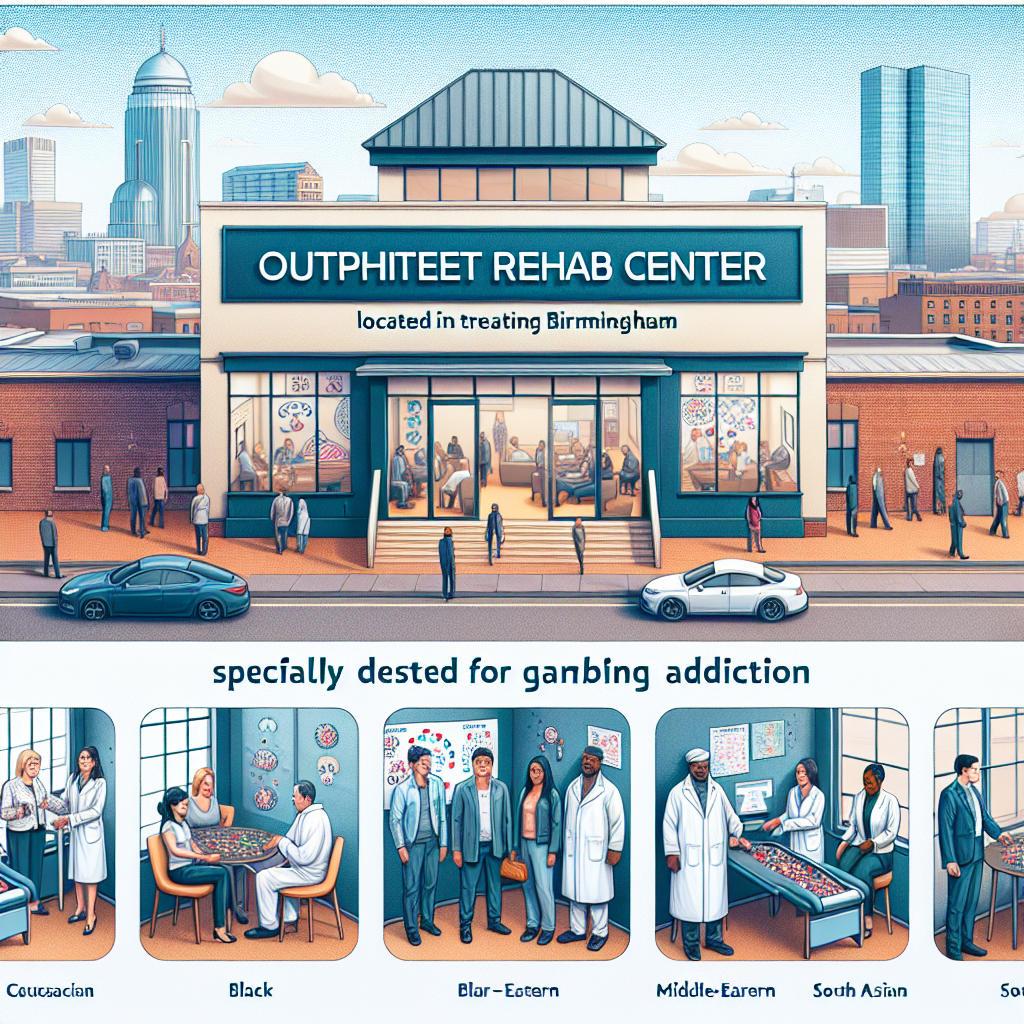-
Table of Contents

“Reclaim Control: Effective Outpatient Rehab for Gambling Addiction in Birmingham”
Introduction
Outpatient rehab for gambling addiction in Birmingham offers a structured and supportive environment for individuals seeking to overcome their gambling problems while maintaining their daily responsibilities. This type of treatment typically involves a combination of individual therapy, group counseling, and educational sessions designed to address the underlying causes of gambling addiction and develop healthier coping mechanisms. Patients attend scheduled sessions at a treatment center but continue to live at home, allowing them to apply new skills in real-world settings. The program often includes cognitive-behavioral therapy (CBT), motivational interviewing, and relapse prevention strategies, all tailored to meet the specific needs of each individual. Additionally, outpatient rehab may provide access to support groups and resources for family members, fostering a comprehensive approach to recovery.
Understanding the Process: How Outpatient Rehab for Gambling Addiction Operates in Birmingham
Outpatient rehab for gambling addiction in Birmingham offers a structured yet flexible approach to recovery, allowing individuals to maintain their daily responsibilities while receiving the support they need. This form of treatment is particularly beneficial for those who cannot commit to an inpatient program due to work, family, or other obligations. Understanding how outpatient rehab operates can provide insight into its effectiveness and inspire those struggling with gambling addiction to seek help.
The journey typically begins with an initial assessment, where a team of professionals evaluates the individual’s gambling behavior, mental health, and personal circumstances. This comprehensive evaluation helps to create a tailored treatment plan that addresses the unique needs of the individual. The personalized nature of outpatient rehab ensures that each person receives the specific support required to overcome their addiction.
Following the assessment, the core of outpatient rehab involves regular therapy sessions. These sessions can be conducted individually or in group settings, depending on the individual’s preferences and needs. Cognitive-behavioral therapy (CBT) is a common approach used in these sessions, as it helps individuals identify and change the thought patterns and behaviors that contribute to their gambling addiction. By learning to recognize triggers and develop healthier coping mechanisms, individuals can gradually regain control over their lives.
In addition to CBT, other therapeutic techniques such as motivational interviewing and mindfulness-based therapies may be employed. Motivational interviewing helps individuals find the internal motivation to change their behavior, while mindfulness-based therapies teach them to stay present and manage stress without resorting to gambling. These diverse therapeutic approaches ensure a well-rounded treatment experience that addresses both the psychological and emotional aspects of addiction.
Support groups also play a crucial role in outpatient rehab for gambling addiction. These groups provide a safe and non-judgmental space for individuals to share their experiences, challenges, and successes with others who understand what they are going through. The sense of community and mutual support found in these groups can be incredibly empowering, helping individuals feel less isolated and more motivated to stay on the path to recovery.
Moreover, outpatient rehab programs often incorporate educational components to help individuals understand the nature of gambling addiction and its impact on their lives. Workshops and seminars on financial management, stress reduction, and healthy lifestyle choices equip individuals with practical skills to rebuild their lives and prevent relapse. By addressing the broader context of addiction, these educational sessions contribute to a more sustainable recovery.
Family involvement is another critical aspect of outpatient rehab. Addiction affects not only the individual but also their loved ones. Family therapy sessions can help repair relationships, improve communication, and create a supportive home environment conducive to recovery. When families are involved in the healing process, the chances of long-term success are significantly enhanced.
Throughout the outpatient rehab process, continuous monitoring and follow-up are essential. Regular check-ins with therapists and counselors ensure that individuals stay on track and receive ongoing support as they navigate the challenges of recovery. This ongoing care helps to reinforce the skills and strategies learned during treatment, reducing the risk of relapse.
In conclusion, outpatient rehab for gambling addiction in Birmingham offers a comprehensive and flexible approach to recovery. Through personalized treatment plans, various therapeutic techniques, support groups, educational components, and family involvement, individuals can find the support they need to overcome their addiction and build a healthier, more fulfilling life. The journey may be challenging, but with the right support and determination, recovery is within reach.
Key Benefits of Choosing Outpatient Rehab for Gambling Addiction in Birmingham
Outpatient rehab for gambling addiction in Birmingham offers a lifeline to those struggling with compulsive gambling, providing a structured yet flexible approach to recovery. One of the key benefits of choosing outpatient rehab is the ability to maintain daily responsibilities while receiving treatment. This flexibility is particularly advantageous for individuals who cannot afford to take extended time off work or away from family commitments. By allowing patients to attend therapy sessions during evenings or weekends, outpatient rehab ensures that recovery does not come at the expense of other important aspects of life.
Moreover, outpatient rehab programs in Birmingham are designed to be highly personalized, catering to the unique needs of each individual. This tailored approach is crucial because gambling addiction can manifest differently from person to person. Some may be driven by the thrill of the game, while others might be seeking an escape from emotional pain. By offering individualized treatment plans, outpatient rehab centers can address the specific triggers and underlying issues that contribute to each person’s addiction. This personalized care often includes a combination of cognitive-behavioral therapy, group therapy, and one-on-one counseling, all aimed at helping individuals develop healthier coping mechanisms and a more balanced lifestyle.
Another significant benefit of outpatient rehab is the opportunity for patients to apply what they learn in real-time. Unlike inpatient programs, where individuals are removed from their everyday environment, outpatient rehab allows patients to immediately implement the strategies and skills they acquire during therapy sessions. This real-world application can be incredibly empowering, as it enables individuals to navigate the challenges of daily life while receiving ongoing support. For instance, a person might learn techniques to manage urges and then practice these techniques in situations where they would typically feel tempted to gamble. This immediate application helps to reinforce new behaviors and build confidence in one’s ability to maintain sobriety.
Community support is another cornerstone of outpatient rehab for gambling addiction in Birmingham. Many programs emphasize the importance of building a strong support network, both within the rehab community and in the patient’s personal life. Group therapy sessions provide a safe space for individuals to share their experiences, gain insights from others, and develop a sense of camaraderie. This sense of belonging can be incredibly motivating, as it reminds individuals that they are not alone in their struggle. Additionally, outpatient programs often encourage family involvement, recognizing that loved ones play a crucial role in the recovery process. By involving family members in therapy sessions or offering family-specific counseling, these programs help to repair relationships and create a more supportive home environment.
Furthermore, the accessibility of outpatient rehab in Birmingham makes it an attractive option for many. With numerous facilities and programs available, individuals can find a rehab center that fits their specific needs and preferences. This accessibility ensures that help is within reach for anyone ready to take the first step towards recovery. The convenience of local treatment options also means that individuals can continue to benefit from the support of their community long after the formal rehab program has ended.
In conclusion, outpatient rehab for gambling addiction in Birmingham offers a comprehensive and flexible approach to recovery. By allowing individuals to maintain their daily responsibilities, providing personalized treatment plans, facilitating real-time application of new skills, fostering community support, and ensuring accessibility, these programs empower individuals to overcome their addiction and build a healthier, more fulfilling life. The journey to recovery may be challenging, but with the right support and resources, it is entirely achievable.
Q&A
1. **Question:** What types of therapies are commonly used in outpatient rehab for gambling addiction in Birmingham?
**Answer:** Outpatient rehab for gambling addiction in Birmingham commonly uses cognitive-behavioral therapy (CBT), group therapy, and individual counseling to help individuals understand and change their gambling behaviors.
2. **Question:** How long does outpatient rehab for gambling addiction typically last in Birmingham?
**Answer:** The duration of outpatient rehab for gambling addiction in Birmingham can vary, but it typically lasts from several weeks to several months, depending on the individual’s needs and progress.
Conclusion
Outpatient rehab for gambling addiction in Birmingham typically involves a structured program where individuals attend scheduled therapy sessions and support groups while continuing to live at home. These programs often include cognitive-behavioral therapy (CBT), individual counseling, group therapy, and educational workshops aimed at understanding and managing gambling behaviors. Patients receive personalized treatment plans and may also have access to financial counseling and family therapy to address the broader impacts of their addiction. The goal is to provide comprehensive support and strategies to help individuals achieve and maintain recovery while integrating back into their daily lives.



